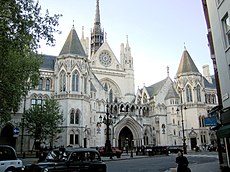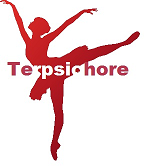 |
| Royal Courts of Justice
Author Anthony M
Creative Commons Licence
Source Wikipedia
|
Copyright is a property right which subsists in original literary, dramatic, musical or artistic works, sound recordings, films or broadcasts, and typographical arrangement of published editions. It is the exclusive right to do or authorize the following acts in respect of the work:
(a) to copy the workAnyone who does or authorizes any of those acts in the UK without the licence of the owner infringes that right, Such an infringer may be sued in the civil courts or in some circumstances prosecuted in the criminal courts. If found guilty the penalties for copyright infringement are approximately the same as for theft.
(b) to issue copies of the work to the public
(ba) to rent or lend the work to the public
(c) to perform, show or play the work in public
(d) to communicate the work to the public
(e) to make an adaptation of the work or do any of the above in relation to an adaptation.
As civil litigation can be expensive owners of certain types of copyright works have established organizations known as "collecting societies" to enforce their copyrights. One of those collecting societies is PRS for Music which describes itself as "the home of PRS and MCPS, representing the rights of over 115,000 members in the UK," The PRS and the MCPS are two separate collecting societies representing respectively the rights of the owners of the copyrights in words and music and those of the owners of the copyrights in the sound recordings. PRS for Music offers to license the performance of their members' works on terms that are regulated by statute. They have reciprocal agreements with collecting societies in other countries to enforce the rights of foreign collecting societies' members' rights here, The foreign collecting societies enforce the rights of British copyright owners elsewhere.
The statute that protects the rights of copyright owners in the United Kingdom is The Copyright, Designs and Patents Act 1988 ("the CDPA"). Section 2 of that Act confers the exclusive tight mentioned above subject to a number of exceptions. One of those exceptions is provided by s,34:
"34 Performing, playing or showing work in course of activities of educational establishmentDoubts have arisen over the years as to whether a dance school falls within that exception. Until the beginning of this year it was the opinion of PRS for Music that it did not. Following representations from the Royal Academy for Dance (see PRS for Music - Educational Exemptions 4 Jan 2016) the collecting society appears to have changed its position. In its PRS for Music Charging Policies the collecting society writes that it has a number of non-charging policies that define circumstances in which it chooses not to make a charge for its licence and one of these is dance schools:
(1) The performance of a literary, dramatic or musical work before an audience consisting of teachers and pupils at an educational establishment and other persons directly connected with the activities of the establishment--(a) by a teacher or pupil in the course of the activities of the establishment, or(2) The playing or showing of a sound recording, film or broadcast before such an audience at an educational establishment for the purposes of instruction is not a playing or showing of the work in public for the purposes of infringement of copyright.
(b) at the establishment by any person for the purposes of instruction, is not a public performance for the purposes of infringement of copyright.
(3) A person is not for this purpose directly connected with the activities of the educational establishment simply because he is the parent of a pupil at the establishment."
"Section A - Dance Schools that are educational establishments
Where a dance school qualifies as an educational establishment, section 34 of the 1988 Act provides that a public performance licence will not be required from PRS (or any other copyright owner) for performances before an audience of teachers and pupils/students at the school (and other persons directly connected with it) provided that the performance is given
- by a teacher or pupil in the course of the activities of the dance school; or
- at the dance school by any person for the purposes of instruction.
Section B - Dance tuition provided by persons other than educational establishmentsFirst, it has to be stressed that that is only a position statement from a collecting society - albeit a powerful one - and not a statute, judgment or other authoritative statement of the law. Having said that, I stress that I do not necessarily disagree with it. If anyone wants to challenge that position in respect of charges made in previous years they can still do so though I am not encouraging (or indeed discouraging) them to do so. Secondly, this statement does not bind copyright owners who are not represented directly or indirectly by PRS for Music. Thirdly, this position statement applies only to the United Kingdom and those other territories to which the CDPA applies.
Where copyright music is used for the purpose of dance tuition, a licence will ordinarily be required by the course provider. However, if the music is performed within the context of and for the purposes of a lesson and/or examination leading to a qualification aligned with Regulated Qualifications Framework (RQF) Level 1 or above, [for the purposes of calculating charges under the dance tuition session of the current DS tariff and proposed new Fitness and Dance Tariff], PRS is willing to treat such performance as if it were given in circumstances to which section 34 of the Copyright, Designs and Patent Act 1988 applies and accordingly will not make any charge respect of that session."
If anyone wants to learn more about copyright in music or relating to dance, exemptions and licences, collecting societies and enforcement he or she should call me on 020 7404 5252 during office hours or use my contact form.

No comments:
Post a Comment